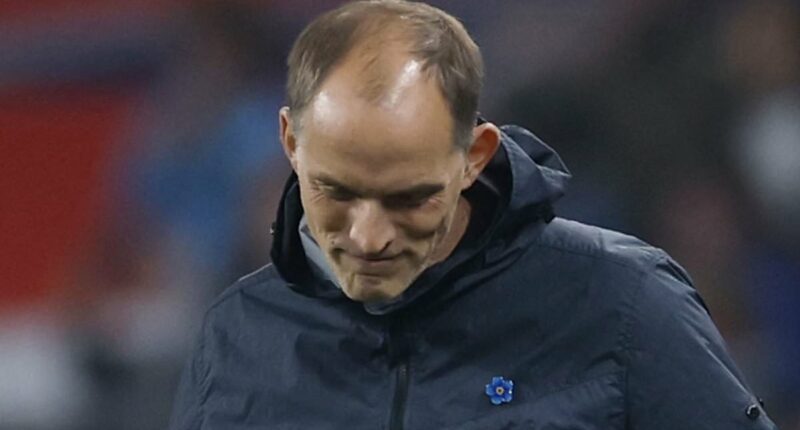Share this @internewscast.com
Almost a year back, when Thomas Tuchel first discussed his new role, he expressed a desire for the England team to reflect the Premier League’s style of play.
This opinion wasn’t universally popular. Critics argued that English football had moved beyond its old ways of playing long balls and relying on raw power to become more refined, especially after reaching two European Championship finals in 2021 and 2024.
Recently, at Wembley, close to where Tuchel made those comments last October, signs of his vision seemed to become reality for the England manager.
This topic is more complex than it seems. Tuchel must integrate his key players into the team by the World Cup next June, and he is surely aware of this necessity.
Yet, after securing significant victories both here and in Serbia last month, it’s clear Tuchel’s team is on track to showcase the style of football he aimed for from the outset when they head to America.

Thomas Tuchel started to see something approaching vindication in the victory over Wales

Bukayo Saka’s strike – England’s third goal of the night at Wembley – was perfect
Only a year ago, interim coach Lee Carsley struggled unsuccessfully to fit Bellingham, Cole Palmer, and Phil Foden into a cohesive lineup, culminating in England’s Nations League loss to Greece.
Here against the Welsh, Tuchel’s England presented themselves in a completely different way. Playing a team that at least in principle wanted to engage, England were indeed too powerful and direct and pragmatic for their opponents.
In the latter stages of Gareth Southgate’s time – by the end when his players had grown too familiar with the messaging – England’s use of the ball became predictable and tired. Too intricate. Too backwards and sideways. A mess, really.
Tuchel’s England have been subtly turned away from that. This at Wembley was a team of players operating at a level that we see from them on a Premier League weekend. Not too proud to cross the ball from deep. Not scared to embrace a set piece – something else Tuchel has preached from the start. Not afraid of playing a ball in to a channel and turning an opponent round.
An early goal helped. They always do. A second early goal helped even more. The third – from Bukayo Saka – was just perfect. The opening two were scrappy, ugly even. But they also spoke to players wishing to do the dirty stuff, of pursuing a lost cause when players in red had given up – as Marc Guehi did in only the 2nd minute – and of making the most of opportunities presented to them by a rival that seemed intent on going home broken.
There was a ruthlessness that Tuchel will have liked. Hence he will have enjoyed the first two goals – from eight yards and one yard – as much as he will Saka’s thing of beauty.
In America next summer it will be different. Tuchel attended the Club World Cup in the summer and came home concerned about just how hot it was.
‘Have you tried to run in Charlotte at 2pm,’ he asked just last Friday.
England will have to find different ways of playing, especially if kick-off times are not pushed back to later in the day as is being mooted. They will also encounter the dreaded low block, especially in the group stage when opponents in such a bloated tournament are expected to be limited in ambition.

One of the most important positions in Tuchel’s England team is now Morgan Rogers’ to lose

Rogers, who scored England’s second, is the kind of prototype footballer that Tuchel wants with him in America
So England will need to be versatile. They will need their safe breakers. Impact players off the bench will on occasion be just as important as those who start.
But the key point today – eight months out from the start of the tournament – is that England are suddenly starting to develop some momentum.
Tuchel said last week that it was a training session that took place between the rather tepid 2-0 win over Andorra at Villa Park and the 5-0 thrashing of Serbia three days later that saw a number of players force their way into his team.
It can be presumed that one of those was Morgan Rogers. The 23-year-old did not start at Villa Park, his home stadium, and only came on with 22 minutes to go. Eberechi Eze played in the number ten spot that afternoon.
Rogers played in Belgrade, though, and did so again here. It is clear that one of the most important positions in Tuchel’s 4-2-3-1 formation is now his to lose and it is this that presents the greatest obstacle to Bellingham’s return.
One of the things that does frustrate Tuchel about the Real Madrid player is his infuriating positional indiscipline. The manager has drummed home the need to play the position and let everyone else play theirs but has not seen the response he hoped.
Here, Rogers was a danger throughout and remained one of his team’s better players when their levels started to drop in the second half.
Rogers is the kind of prototype footballer that Tuchel wants with him in America. More widely, he wants some kind of dependability of performance. This is the point he was trying to make a year ago and he will now feel, with some degree of justification, that his team is starting to get there.











